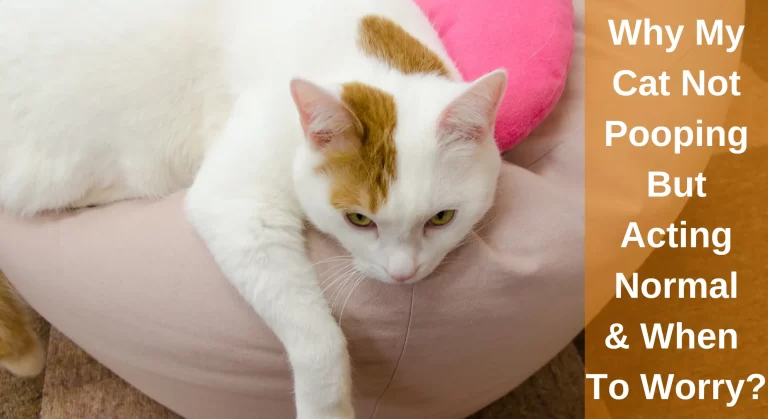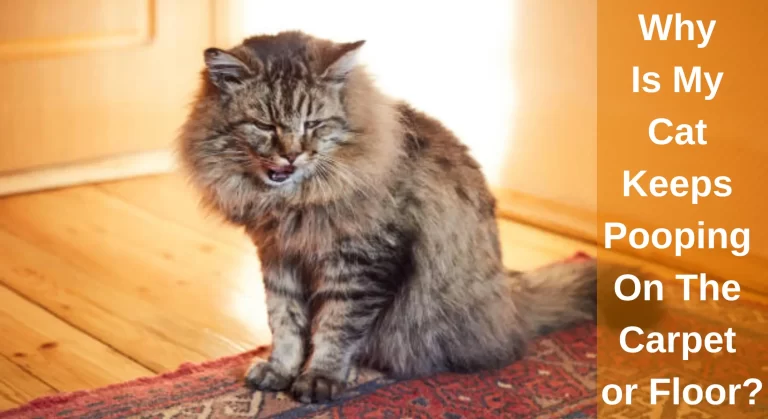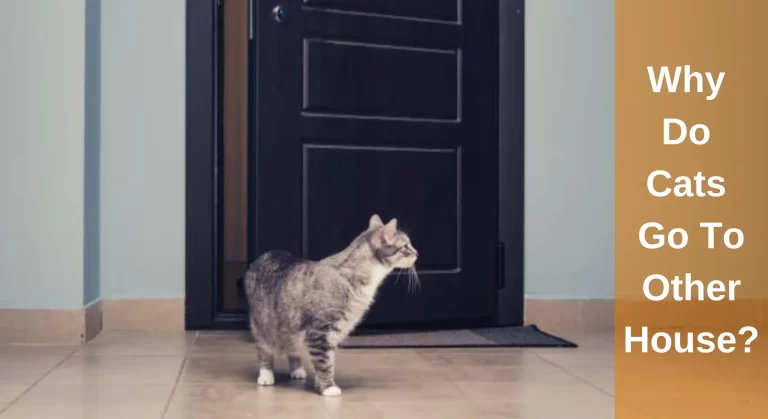Do Cats Pee When Scared Or Stressed? Reasons You Should Know
Cats don’t get frightened easily, but because of their great level of sensitivity, they occasionally get scared of many things they encounter. Many cats react by freezing up, pulling their ears backwards, acting aggressively, or hissing. Peeing is one more typical response when your cat is terrified. However, most cat owners ask if it is common.
Why do cats pee when scared? Cats urinate as a sign of surrender when they feel afraid. When cats are severely afraid, they’ll unintentionally urinate. They may also urinate out of fear to diffuse or stop a conflict before anyone is wounded. Moreover, cats also urinate when afraid to make them relax.
So, the short answer to the question of whether cats urinate when afraid is yes. We wrote this article to assist cat owners in coping with this problem worldwide. Continue reading to learn the reasons for cats’ peeing and how you can assist your felines in stopping peeing or overcoming their fears.

Do Cats Pee When They are Scared? Why Does My Cat Pee When Scared? Reasons
The following are the top five causes of felines urinating when they’re terrified. These reasons will prepare you for dealing with scared cats:
1. Unwilling Urination
Your cat may pee unintentionally if it becomes highly scared or afraid. Both animals and humans can accidentally urinate. This response is brought on by the limbic brain, which urges your cat to defend itself in the face of danger.
Whenever it occurs, the cat loses control over the urine it produces and creates a mess for you. This frequently happens when your cat experiences something new or if it’s overly anxious.
2. Indication of Submission
Peeing also shows the cat’s way of expressing submissive. Cats frequently exhibit this behaviour when you bring a new cat into your home. Cats’ fights may get violent, and one of them may get hurt.
In this case, a cat urinates as a sign of submission to its enemy when the situation gets out of hand. If this occurs, the feline might continue to urinate every time it engages in catfights with some other felines.
Also Read: How To Introduce A Kitten To An Older Cat?
3. Identification of Stress Territories
If you relocate or let your cat go to areas of the house where it has never gone previously, anxiety territorial indicating via pee is more likely to occur.
It also occurs when they’re under stress. Moreover, cats experience a wide range of problems, so territorial marking under stress is a common issue.
Also, Check Out: How Long Will a Scared Cat Hide? A Guide to Hiding Behaviour
4. Comfort Aroma
Specified fragrances can provide solace to both pets and humans. Due to this, some felines may urinate when frightened. They’ll get calmer more quickly after smelling their pee. The majority of cats have this problem when their surroundings change or if a new furry friend joins the family.
5. Not Neutered
Cats that haven’t been spayed are probably more inclined to urinate when frightened. Unsprayed felines can pee on walls, furnishings, and other parts of your house. In this case, spaying your cat is a beneficial option if it is possible.
Find Out: How Long to Keep a Cat Confined After Spay or Neuter?
Do Cats Pee and Poop When Scared?
Some cats may experience extreme fear that they immediately give up control of their urinary bladder or bowels and urinate.

Some cats may urinate, poop, or may do both of them when they’re scared or upset after a battle with other felines or after experiencing something new. In this case, the cat’s body reacts under stressful conditions that make them do pee and poop.
Do Female Cats Pee When Scared?
Stress is a common issue that occurs in both female and male felines. So, Yes, even your female cat will pee or poop when she gets scared of something unusual in your home surrounding or any other reasons that are mentioned above.
How to Stop a Cat from Peeing When Scared?
The most effective way is to support your cat in learning how to handle stressful and frightening conditions. If you see your cat urinating while afraid, you can try the following:

- Talk about the issue with your veterinarian.
- Give your extra cat affection and fun activities.
- Cuddle your cat.
- Ensure a secure and relaxing environment in your home for your cat to live in. Properly clean those areas where the cat has previously pooped/peed.
- Cleaning up your cat’s litter box regularly.
Make sure your vet is aware of all facts about your cat’s peeing behaviour, as peeing while afraid also indicates that your cat may be facing some health problem.
Causes of Fear in Cats
Cats may get scared of any strange, odd, or scary in their environment. The majority of cats are frightened quickly by the following stress factors:

- New canines and felines
- Unfamiliar locations and visitors
- Severe weather conditions
- Fireworks
- High sounds
- Veterinarian examinations
- Migration to a new place
- Fight with other pets.
In order to assist and soothe your felines in these circumstances, you must try to observe their behaviour.
Signs of a Scared Cat
Cats show a variety of common behaviours that can help you identify when they’re anxious:

- Alterations in eating patterns; less drinking or excess eating
- Unexpected weight increases or drop
- Taking more naps than normal and feeling lazy
- More needy and clingy than normal
- Growling and gurgling at family members or other pets
- Reluctant to use their litter box
- Consuming things that aren’t food
- Constipation, nausea, and diarrhoea
- Becomes more introverted and stranger than usual
- Scratch furniture items more.
- Nasal licking and forceful ingestion
- Unwilling to play with you
- Unaware of what is going on in their surrounding
Your cat may squat and refuse to be petted if he’s scared. When cats are stressed and agitated, they show certain visual signs:
- Flattening or “airplane” ears
- Fast breathing
- Shaggy faces forward
- Pupil dilation and wide eyes
How to Calm a Scared Cat?
You can easily comfort your cat when it gets scared by following these tips:

1. Give Them Space for Some Time
Sometimes cats need space to feel safe and relaxed. So, you must provide them with a space where they can be calm. To help your cat relax when frightened or anxious, you can give them scratchers, stuffed animals, or any other item they enjoy.
Intresting Reading: Why Is My Cat So Scared of Everything: How to Comphy My Scared Cat?
2. Don’t Compel them to Interact with People
When your cat is scared, don’t force them to interact with others. This action might be dangerous for your cat. Instead, give them space to adapt to new people and circumstances. Once they feel secure, they’ll meet visitors immediately.
3. Keep Yourself Cool Under Pressure
Keep yourself calm and strive to quiet down your feline if you notice that it’s terrified or agitated. You can pet or snuggle your cat if it’s affectionate so that he’ll feel less anxious. Your cat may react vigorously and take longer to be calm if it senses your anxiety.
4. Recovering Felines
Felines may require a significant amount of time to assimilate things and feel at ease and secure once again, based on how distressing or frightening the cause was. Whatever the cause of your cat’s fear, you must understand your cat and give them some space and privacy.
Don’t try to hasten the healing process because doing so can demotivate or frighten your cat once more.
Check Out: Do Calming Collars Work For Cats? Top Tips To Reduce Anxiety and Stress in Cats
Tips: How To Prevent Fears from Developing in Your Feline
Although some felines are shy by nature, some are also friendly. You can create a schedule from an early age that will assist your cat in dealing with fearful conditions and try to prevent them from becoming frightened. Follow the below suggestions to make your felines more confident:
- Introduce your cats to humans and animals of various ages in their early ages.
- Expose your cat to new situations and fear-triggering elements.
- Set up a schedule
- Eliminate all underlying fears.
- Let the cat be your lead.
Frequently Asked Questions
Do cats poop on the floor when mad?
Yes, if their special companion or favourite toy is permanently lost, they may get mad. Their anxiety hormones rise, and their hearts beat begins to accelerate as a result. Additionally, it may cause digestive and intestinal irritation, which may lead to urination.
Do Cats Poop When Stressed?
Due to different stress situations such as dietary modifications, the tension of adapting to a new home, or engaging with new people, cats may do soft stool or even diarrhoea.
Do cats pee when upset?
A cat’s urination patterns may occur when they get upset because of any normal change, including welcoming a new family member or traveling. So, to mark their territory in a specific place of your home, they may urinate inside the home.
Can a cat poop out of fear?
When cats face something, someone, or a situation as a danger, they’re unable to hold their urine, causing them to urinate out of fear on your home floor or walls.
Final Words!
Cats will urinate when they’re afraid of the above-mentioned things. You assist your cat in overcoming its anxiety and worry after eliminating any potential medical conditions that might be the cause of urination.
Some felines require more time than others to adapt themselves to changes. So, we advise you to minimize the issue rather than punishing your feline. Make your cats believe that you’re always with them and that they can depend on you when they get scared.
We’re sure you’ve picked up a few tips on making your frightened cat comfortable in your house and preventing it from peeing when it gets scared.
Related Posts:
- Why Is My Cat Peeing Everywhere All of a Sudden?
- Why Is My Cat Peeing on the Bed or Couch?
- Can I Use My Glucose Meter For My Cat?
- Why My Cat Keeps Peeing In The Same Spot
- How To Stop A Cat From Peeing On Clothes?
- Can Cat Wear Diapers? Cat Diapers 101
- Why Cat Peeing Over Edge of Litter Box?
- My Cat Is Eating And Drinking But Not Peeing; why?
- Why My Cat Suddenly Wakes Up Scared?
- Why is My Cat Afraid of Ceiling Fan?
- How to Make a DIY Cat Diaper?
Who is Isabella?
My name is Isabella, and I am a dedicated and knowledgeable cat enthusiast. With years of experience caring for cats and a deep love for felines, I made a mission to help other cat lovers navigate the challenges of cat ownership.






